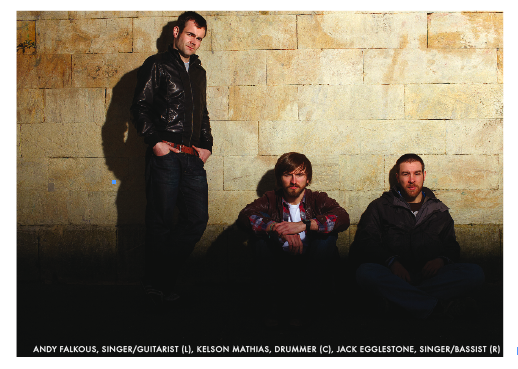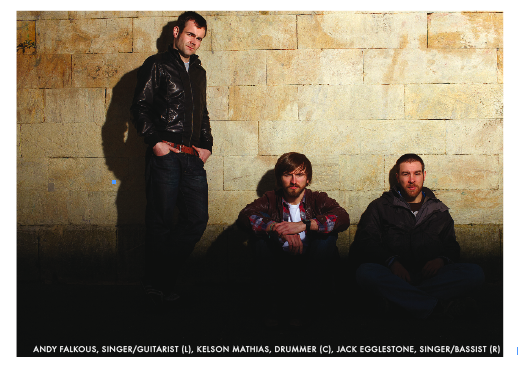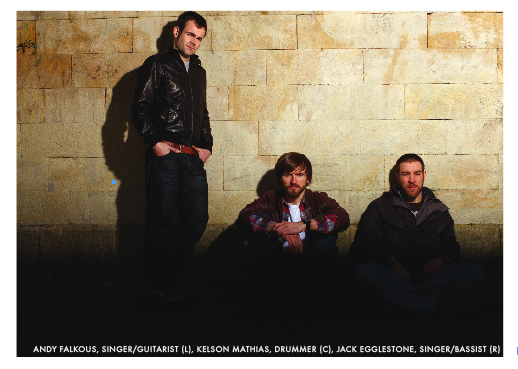 Franck Martin has a chinwag with front man Andy ‘Falco’ Falkous from the delightfully abrasive, refreshingly anarchic alt rockers Future Of The Left.
Franck Martin has a chinwag with front man Andy ‘Falco’ Falkous from the delightfully abrasive, refreshingly anarchic alt rockers Future Of The Left.
What is the future of the left?
We have just finished mastering our latest album and putting the different bits of our work together, which is always far more complicated than it should be. We have a release date now (due out in June) and then we will be touring around that and beyond that The Future of the Left will either be a succession of temporary jobs or continuing if the record is successful enough in order to justify that.
What can we expect from ‘Travels With Myself And Another’?
Expect really loud rock music that is more direct. It sounds massive, absolutely naturally gigantic. We have developed it in a way that explores melody while being uncompromising to the original sound and ideas of the band.
How has the music progressed since the release of Curses?
Consciously we never came up with an
agenda about what we would do. We knew that we did not want to repeat ourselves but this can be a problem when you are building up momentum and a fan base. When people fall in love with a band they fall in love with the first thing they hear and then want to hear that for the rest of the bands career, whether or not they will admit it that is the truth. So we wanted to trim the fat. It is hardly a record with long intros or instrumental passages. It begins hard and it hits all the way through for 33 minutes. Some people say that is too short but the advantage of this is that if you enjoy it as much as we hope you will then you can put it back onto the start.

You recently premiered some new material at the South by South West Festival, how did the new tracks go down with the crowd?
Very very well. We had played some of the songs in Britain and the reaction was muted to say the least, though these were support slots. We were disappointed as ‘Arming Eritrea’ the first song from the record, is what I call a banker track because if you don’t like that song you will not like the rest but thankfully the reaction in the States was fantastic.
Future of the Left has been the title of various books exploring the decline of the socialist politics. Do you view the band as political?
No. We are all left leaning as individuals, some of us more than others, but it was more a name chosen because it was so striking rather than being part of any overall political agenda.
So would you say that politics belongs in music?
Politics belongs in music as much as humour belongs in music as much as pathos belongs in music as much drama belongs in music. It is all part of the personalities that combine to make the band. I think that when politics is the main thing in the band, or when it is overt in its sense it becomes a little bit po-faced and becomes a case of preaching to the converted. It would disable any good intentions that the band has.
The lyrics have come to be one of the bands more unique trademarks. How do you approach the lyrical process?
The short answer is at the last minute. Most bands approach lyrics from a narrative perspective and then they become a slave to the story. I approach it from the other side and start with some words and sounds and attempt to conger an atmosphere in a natural way. In saying that, the songs on the new record are more linear and should, in theory, make more sense. Arming Eritrea is the exception as it goes off on a couple of tangents that do not make very much sense. There are a few songs that do approach stories of a beginning, middle and end. I am not proud of it but there we are.
So was it a conscious decision to make the lyrics more accessible?
Not at all. It’s about the way songs come from the sky and how the personalities of the band shape this. The second you bring an agenda to a song that is not natural is the second it all goes wrong.
What music has been grabbing your attention of late?
Personally speaking very very little. To be honest To be honest I am always the wrong person to ask about that.
Fair enough. What about up-and -coming bands, are there any that you think people should look out for?
Yes. A band we played with in Manchester called Kong, who are a collection of very noisy and nasty individuals who make really compelling, bizarre music. You are not going to leave whistling any of their tunes – that is really not the point of what they do. Essentially we are a pop band, loud and angry but pop nonetheless. That is not true of Kong.
I typed the band’s name into the NME search engine and it produced 13,600 results. Is the band happy with the attention the NME and the wider media have given them?
I will say in a general sense that it can make things a little bit difficult. I mean I am certainly not an NME reader and I do not get anything about music from print magazines anymore. When I was growing up the NME and Melody Maker were my Bibles and I used to buy records on the basis of reviews. Music journalism used to do records justice but I would question how much the media in general are able to convey that now. It is certainly good to get any exposure, be it from the NME or a guy called Charles in Dumbarton but at this moment in time it has made very little difference to me.
Speaking of NME, would you agree that you have done for guitar music what the Klaxons have done for electro?
I would not say I agree with that but I believe that any opinion about the band is fine unless it dissolves into the arena of personal confrontation. It is a positive comment which I appreciate but personally I regard that comment as demented.
Your most recent outing in Glasgow was at the Captains Rest, a night which ended in a stage invasion and an overzealous punter having a bash at the drums. Does the band have plans to relive this bedlam by the Clyde?
We have one in May. Glasgow crowds are notoriously stationary, especially since our crowd tends to be 18 and over they are a little bit cynical compared to gangs of 15 year olds hurtling against each other.
As a band fame for heckling comebacks, how would you rate Glasgow in terms of its heckling prowess?
The problem is the intelligibility of the heckling as the Scottish accent is not always the best enunciated to us Southerners, even though I am from Newcastle I still suppose up there I am a Southerner. I am sure much of it is very eloquent but internationally the Scots do not have a reputation for long, drawn-out, intellectual discourse but I am sure it is contained within the screams of bollocks.
Is the bollocks multifaceted?
Oho yes, it is layered on many levels.

